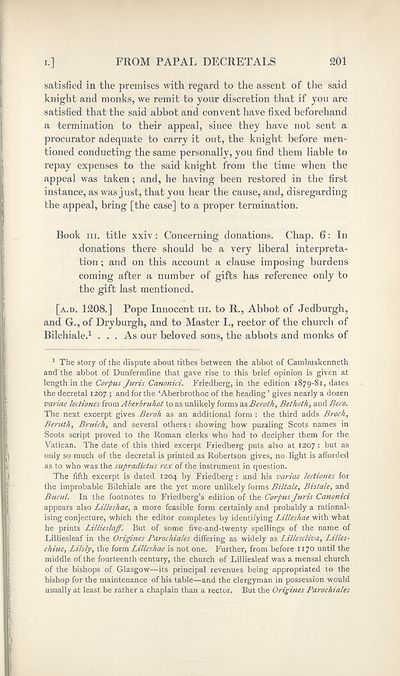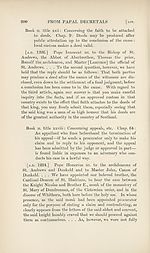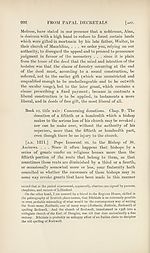Series 1 > Statutes of the Scottish Church, 1225-1559
(322) Page 201
Download files
Complete book:
Individual page:
Thumbnail gallery: Grid view | List view

FROM PAPAL DECRETALS
201
satisfied in the premises with regard to the assent of the said
knight and monks, we remit to your discretion that if you are
satisfied that the said abbot and convent have fixed beforehand
a termination to their appeal, since they have not sent a
procurator adequate to carry it out, the knight before men¬
tioned conducting the same personally, you find them liable to
repay expenses to the said knight from the time when the
appeal was taken; and, he having been restored in the first
instance, as was just, that you hear the cause, and, disregarding
the appeal, bring [the case] to a proper termination.
Book in. title xxiv: Concerning donations. Chap. 6: In
donations there should be a very liberal interpreta¬
tion ; and on this account a clause imposing burdens
coming after a number of gifts has reference only to
the gift last mentioned.
[a.d. 1208.] Pope Innocent in. to R., Abbot of Jedburgh,
and G., of Dryburgh, and to Master I., rector of the church of
Bilchiale.1 ... As our beloved sons, the abbots and monks of
1 The story of the dispute about tithes between the abbot of Cambuskenneth
and'the abbot of Dunfermline that gave rise to this brief opinion is given at
length in the Corpus Juris Canonici. Friedberg, in the edition 1879-81, dates
the decretal 1207 ; and for the ‘Aberbrothoc of the heading ’ gives nearly a dozen
variae lectiones from Aberbruhot to as unlikely forms as Beroth, Bet hoik, and Beco.
The next excerpt gives Beroh as an additional form : the third adds Brock,
Beruth, Bruich, and several others: showing how puzzling Scots names in
Scots script proved to the Roman clerks who had to decipher them for the
Vatican. The date of this third excerpt Friedberg puts also at 1207 : but as
only so much of the decretal is printed as Robertson gives, no light is afforded
as to who was the supradictus rex of the instrument in question.
The fifth excerpt is dated 1204 by Friedberg : and his variae lectiones for
the improbable Bilchiale are the yet more unlikely forms Biltale, Bistale, and
Bucul. In the footnotes to Friedberg’s edition of the Corpus Juris Canonici
appears also Lilleshae, a more feasible form certainly and probably a rational¬
ising conjecture, which the editor completes by identifying Lilleshae with what
he prints Lillieslaff. But of some five-and-twenty spellings of the name of
Lilliesleaf in the Origines Parochiales differing as widely as Lillescliva, Lilles-
chiue, Lilsly, the form Lilleshae is not one. Further, from before 1170 until the
middle of the fourteenth century, the church of Lilliesleaf was a mensal church
of the bishops of Glasgow—its principal revenues being appropriated to the
bishop for the maintenance of his table—and the clergyman in possession would
usually at least be rather a chaplain than a rector. But the Origines Parochiales
201
satisfied in the premises with regard to the assent of the said
knight and monks, we remit to your discretion that if you are
satisfied that the said abbot and convent have fixed beforehand
a termination to their appeal, since they have not sent a
procurator adequate to carry it out, the knight before men¬
tioned conducting the same personally, you find them liable to
repay expenses to the said knight from the time when the
appeal was taken; and, he having been restored in the first
instance, as was just, that you hear the cause, and, disregarding
the appeal, bring [the case] to a proper termination.
Book in. title xxiv: Concerning donations. Chap. 6: In
donations there should be a very liberal interpreta¬
tion ; and on this account a clause imposing burdens
coming after a number of gifts has reference only to
the gift last mentioned.
[a.d. 1208.] Pope Innocent in. to R., Abbot of Jedburgh,
and G., of Dryburgh, and to Master I., rector of the church of
Bilchiale.1 ... As our beloved sons, the abbots and monks of
1 The story of the dispute about tithes between the abbot of Cambuskenneth
and'the abbot of Dunfermline that gave rise to this brief opinion is given at
length in the Corpus Juris Canonici. Friedberg, in the edition 1879-81, dates
the decretal 1207 ; and for the ‘Aberbrothoc of the heading ’ gives nearly a dozen
variae lectiones from Aberbruhot to as unlikely forms as Beroth, Bet hoik, and Beco.
The next excerpt gives Beroh as an additional form : the third adds Brock,
Beruth, Bruich, and several others: showing how puzzling Scots names in
Scots script proved to the Roman clerks who had to decipher them for the
Vatican. The date of this third excerpt Friedberg puts also at 1207 : but as
only so much of the decretal is printed as Robertson gives, no light is afforded
as to who was the supradictus rex of the instrument in question.
The fifth excerpt is dated 1204 by Friedberg : and his variae lectiones for
the improbable Bilchiale are the yet more unlikely forms Biltale, Bistale, and
Bucul. In the footnotes to Friedberg’s edition of the Corpus Juris Canonici
appears also Lilleshae, a more feasible form certainly and probably a rational¬
ising conjecture, which the editor completes by identifying Lilleshae with what
he prints Lillieslaff. But of some five-and-twenty spellings of the name of
Lilliesleaf in the Origines Parochiales differing as widely as Lillescliva, Lilles-
chiue, Lilsly, the form Lilleshae is not one. Further, from before 1170 until the
middle of the fourteenth century, the church of Lilliesleaf was a mensal church
of the bishops of Glasgow—its principal revenues being appropriated to the
bishop for the maintenance of his table—and the clergyman in possession would
usually at least be rather a chaplain than a rector. But the Origines Parochiales
Set display mode to:
![]() Universal Viewer |
Universal Viewer | ![]() Mirador |
Large image | Transcription
Mirador |
Large image | Transcription
Images and transcriptions on this page, including medium image downloads, may be used under the Creative Commons Attribution 4.0 International Licence unless otherwise stated. ![]()
| Scottish History Society volumes > Series 1 > Statutes of the Scottish Church, 1225-1559 > (322) Page 201 |
|---|
| Permanent URL | https://digital.nls.uk/126920850 |
|---|
| Attribution and copyright: |
|
|---|
| Description | Over 180 volumes, published by the Scottish History Society, containing original sources on Scotland's history and people. With a wide range of subjects, the books collectively cover all periods from the 12th to 20th centuries, and reflect changing trends in Scottish history. Sources are accompanied by scholarly interpretation, references and bibliographies. Volumes are usually published annually, and more digitised volumes will be added as they become available. |
|---|


